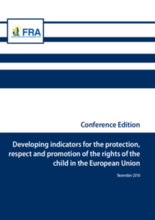The European Union Fundamental Rights Agency (FRA) recently presented their report, Developing Indicators for the Protection, Respect and Promotion of the Rights of the Child in the European Union, which proposes a comprehensive series of indicators to measure child rights across the European Union (EU). These indicators, which will be under constant review, will be used by the FRA to guide its data collection. This will allow the Agency to develop evidence based opinions that will support EU institutions and Member States in further developing and strengthening legal and policy measures to protect, respect and promote child rights within their respective spheres of competence.
The data collected by the FRA on this basis will also support the Commission’s periodic assessment of the effectiveness of its own legislative and other actions in relation to both internal and external measures affecting children. In addition, the FRA will actively promote the use of these indicators with the Member States with a view to gradually developing a more coordinated approach to data collection improving data comparability.
The areas of work for the indicators presented here were selected in accordance
with the following criteria:
- The issue is grounded in the child rights framework, as developed under the 1989 UN Convention on the Rights of the Child, ratified by all EU Member States;
- The issue falls within EU competence;
- There is significant EU added value to developing indicators in this area;
- The issue has been identified by children as being of importance;
- The area affects a significant proportion of the child population in the EU or raises concerns that require an urgent response;
- There is an appreciable and accessible body of existing research and data on which to draw in the application of the indicators;
- There is indication of policy interest at EU level for indicators in this area.
On the basis of these criteria, the developers identified the following core areas that capture a significant part of existing EU provisions of direct relevance to children: Family Environment and Alternative Care; Protection from Exploitation and Violence; Education, Citizenship and Cultural Activities; and Adequate standard of living.
Consistent with the child-rights approach to indicator development, these core indicator areas correspond as closely as possible to the reporting clusters developed by the Committee on the Rights of the Child. The indicators are grounded in a specific conceptual framework characterised by the following key features:
- They adopt the UN CRC as a normative framework
- They respect the limits of EU competence
- They focus specifically on the child’s societal status
- They are ‘Child Rights’ not ‘Child Well-Being’ indicators
- They build on and complement existing indicator sets
The construction and presentation of the indicators is informed by an extensive body of indicators research and literature, conducted both in the broader human rights and development arena,7 at EU level,8 and specifically in relation to child rights and well-being. It is hoped that the distinct EU child rights framework of these indicators will add value to this body of work by providing fresh insights into the consequences and potential of EU law and policy for children.

